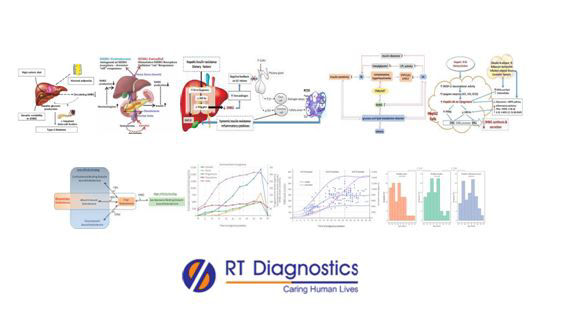Sex Hormone Binding Globulin - SHBG:
Why Sex Hormone Binding Globulin -SHBG Test?
CLINICAL INFORMATION
Estrogen and testosterone hormones help the body to develop its sexual and reproductive tissues. Sex Hormone Binding Globulin (SHBG) is a glycoprotein (Carrier protein) present in the blood that binds to certain sex hormones in the human body (male and females). SHBG is sometimes also referred to as Sex-Steroid Binding Globulin (SSBG). SHBG is produced by the liver and in other organs (in traces) and it plays an integral role in regulating the levels of bioavailable testosterone (androgens in both sexes, but predominantly in males - normally) and/or the levels of estrogens (bio-available) in women. SHBG binds to sex hormones such as testosterone (androgen), Androstenediol (male), estradiol (estrogen), Estrone (female), dihydrotestosterone (DHT) and these carrier bound hormones (SHBG-Sex hormone bound form) become inactive and therefore the levels of SHBG modulates the availability of sex hormones to the body, thereby maintains the regulation. Furthermore, SHBG also regulates the function of insulin and has a strong influence on metabolic syndrome and PCODs. Likewise in menopausal women, higher SHBG levels reduce the incidence of breast cancer. The synthesis of SHBG is blocked by male sex hormones, insulin, prolactin, TNF-alpha (cytokine), sugars (glucose, fructose) etc. This SHBG test is indicated when there are abnormal testosterone levels in the body (eg. either low testosterone in a male patient or in a female patient with high levels of testosterone). SHBG test estimates the level of SHBG protein present in the body. Usually, the test is performed along with other sex hormones such as testosterone (androgen), estradiol (estrogen), dihydrotestosterone – DHT (eg. Total testosterone: since these values i.e free testosterone + SHBG are compared to arrive at a definitive diagnosis i.e, for example, androgen deficiency, hypogonadism). Higher SHBG indicates lower availability of free hormones to tissues and likewise higher levels of free hormones indicate lower SHBG-sex hormones (inbound form). SHBG test may be indicated in cases suspected of low testosterone levels in male patients (especially when the total testosterone test results are unsatisfactory with the presenting complaints) eg. low sex drive, erectile dysfunction (difficulty getting an erection in males), fertility problems, fluid retention, acne, increased appetite, weight gain, increased muscle mass, mood swings etc. high-risk factors for a person to develop SHBG are obesity, insulin resistance, hypothyroidism, Cushing’s syndrome, Non-Alcoholic fatty liver, acromegaly, use of androgen steroids etc. Meanwhile, the SHBG test may be indicated in cases suspected of high testosterone levels in female patients eg. excess body and facial hair growth, deepening of the voice, menstrual irregularities, mood changes, obesity, fertility problems, acne etc. Moreover increased estrogen in females can lead to irregular periods, mood swings, bloating, breast tenderness etc. Factors that impact the levels of SHBG levels are age, sex, weight, genetics, metabolism, obesity, liver disease, hyperthyroidism, pregnancy etc. Low SHBG may be due to hypothyroidism, pituitary disorders due to damage in the hypothalamic-pituitary-adrenal axis, obesity, Cushing’s syndrome, Type-2 Diabetes mellitus, acromegaly, cancer in testes (in males) or adrenal glands, PCODs (in females) tend to have low SHBG levels along with hirsutism, insulin resistance, obesity, excess androgen, type-2 Diabetes mellitus, metabolic syndrome, cardiovascular risk etc. While a high SHBG can be found in cases such as hepatitis, hyperthyroidism, tumour in the pituitary and/or its associated pituitary disorders, Addison’s disease, HIV, and patients with anti-convulsants medications to treat seizures etc. Additional tests include pituitary hormones such as GnRH, FSH, LH, prolactin etc.

General Instructions:
Sample Requirement: Specimen - Blood sample collected from the vein. Test Preparation: None.
NOTE - Sample for specimen collections may vary based on the patient’s condition/cases according to the patient’s presenting complaints/signs or symptoms:
SPECIMEN REQUIREMENT (Special or Rare Cases) - As instructed and guided by Physician / Clinician / Pathologist / as per Laboratory’s requirements, according to procedures and protocols.
This Multi-Specialty Clinical Referral Laboratory RT DIAGNOSTICS provides precise and accurate tests with an extensive range of testing services to the medical centres to help in the diagnosis and identification of pathology in the test specimens for infectious diseases and also to evaluate the function of organ systems of the patient. It prevents further complications and helps to stabilize and restore health to near normalcy at the earliest without delay.



